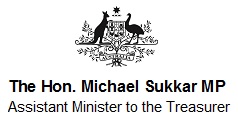Stay up-to-date by signing up to receive Michael’s eNewsletter.
Subscribe Now
REDUCING PRESSURE ON HOUSING AFFORDABILITY
Joint media statement with the Treasurer, The Hon Scott Morrison MP
The Turnbull Government is ensuring home ownership is more achievable for ordinary Australians, and that they have access to secure and affordable housing.
Housing affordability is a major issue affecting many Australians and there is no silver bullet.
To support Australian households, the Government has a comprehensive plan that will improve outcomes across the housing spectrum – from the homeless and those who depend on social housing, to first home buyers and older Australians looking to downsize.
Supporting home ownership
The Government is making changes that will help more people realise their goal of home ownership.
We will empower first home buyers to save for their first home by allowing them to build a deposit inside their superannuation. They will be able to access generous tax concessions to build more savings faster.
From 1 July 2017, Australians can contribute up to $15,000 per year in voluntary contributions, up to $30,000 in total that can be withdrawn for a first home deposit. Withdrawals will be allowed from 1 July 2018. Couples will be able to both access the scheme and combine savings for a single deposit.
People’s contributions and earnings will be taxed at only 15 per cent rather than marginal tax rates and withdrawals taxed at marginal tax rates less a 30 per cent offset. Contributions must be made from within existing caps.
To help free up larger homes for younger families, from 1 July 2018, older Australians considering downsizing will be given the flexibility to contribute up to $300,000 from the sale proceeds of their home into superannuation as a non-concessional contribution.
Building more homes
A key factor in easing housing affordability now, and into the future, is building more homes.
The Government will boost the supply of housing by working with state and territory governments to set housing supply targets and facilitate planning and zoning reform. This will be achieved through:
- Working with State and Territory governments to introduce a new National Housing and Homelessness Agreement, with the requirement for concrete outcomes, which will increase the supply of new housing for all Australians across the housing spectrum, particularly those most in need. The new Agreement will include an additional $375.3 million of Commonwealth funding to help people who are homeless and those in need of crisis accommodation. This will provide greater certainty to those organisations that provide frontline homelessness services and will continue to prioritise people affected by domestic violence and vulnerable young Australians.
- Establishing a $1 billion National Housing Infrastructure Facility based on the program set up in the United Kingdom, to work with States and Territories to fund deals with local governments to remove infrastructure impediments to developing new homes and apartments on selected sites.
- Making under-utilised and surplus Commonwealth land available for housing development to create opportunities for developers and others in the community to propose better use of the land, including for housing. As a first step, 127 hectares of surplus Defence land in Maribyrnong in Melbourne will be made available for housing. This could support up to 6,000 new homes less than 10 kilometres from the CBD.
Even tougher rules for foreign investors
An annual charge of at least $5,000 on foreign owners of residential real estate will be applied where Australian residential property is not occupied or genuinely available on the rental market for at least six months of the year. The measure is designed to free up more dwellings for Australian renters and applies to applications to acquire property from 7:30pm Budget night.
The new charge builds on the Government’s existing foreign investment regime, which seeks to increase the number of houses available for Australians to live in, by creating a financial incentive for foreign owners to make their property available on the rental market.
Foreign ownership in new developments will be limited through the introduction of a 50 per cent cap on the number of properties that can be sold to foreign investors through developer pre-approvals.
The cap will be included as a condition on all New Dwelling Exemption Certificates for new property developments where the application is made from 7.30pm on Budget night. This measure will mean Australian buyers will have access to more dwellings in these developments.
Better targeting tax concessions
From 1 July 2017, the Government will disallow deductions for travel expenses related to owning a residential investment property. This is an integrity measure to address concerns that such deductions are being abused. This will rein in a high growth deduction item and improve taxpayer confidence in the negative gearing system.
The Government will also confine plant and equipment depreciation deductions for items that can be easily removed, such as carpets and dishwashers, only to those expenses actually incurred by investors.
Boosting investment in affordable housing
The Government will encourage private investment in affordable rental accommodation for low to moderate income households through a range of new incentives.
Private investors will be encouraged to invest in new and existing affordable housing. From 1 January investors, in qualifying for affordable housing, will be entitled to a 60 per cent discount on capital gains if they hold the investment for a minimum of three years in aggregate. To qualify for the discount, housing must be provided at below market rent, and made available for tenants on low to moderate incomes and be managed by a registered community housing provider. From 1 July 2017, Managed Investment Trusts will be able to set up to acquire, construct or redevelop property to hold as affordable housing. This will incentivise foreign and domestic investors to invest in affordable housing.
A new National Housing Finance and Investment Corporation (NHFIC) will be established by 1 July next year to provide long term, low cost finance to community housing providers for affordable housing projects. This will also assist in attracting large scale investors, including superannuation funds, into the affordable rental sector.
The Government will enable direct deduction of rent from welfare payments of tenants in public and community housing providers. This has been agreed with the majority of States and Territories, and will provide greater income certainty for investors in this type of rental accommodation.
These measures will also support State, Territory and local governments imposing inclusionary zoning requirements on new development sites.

